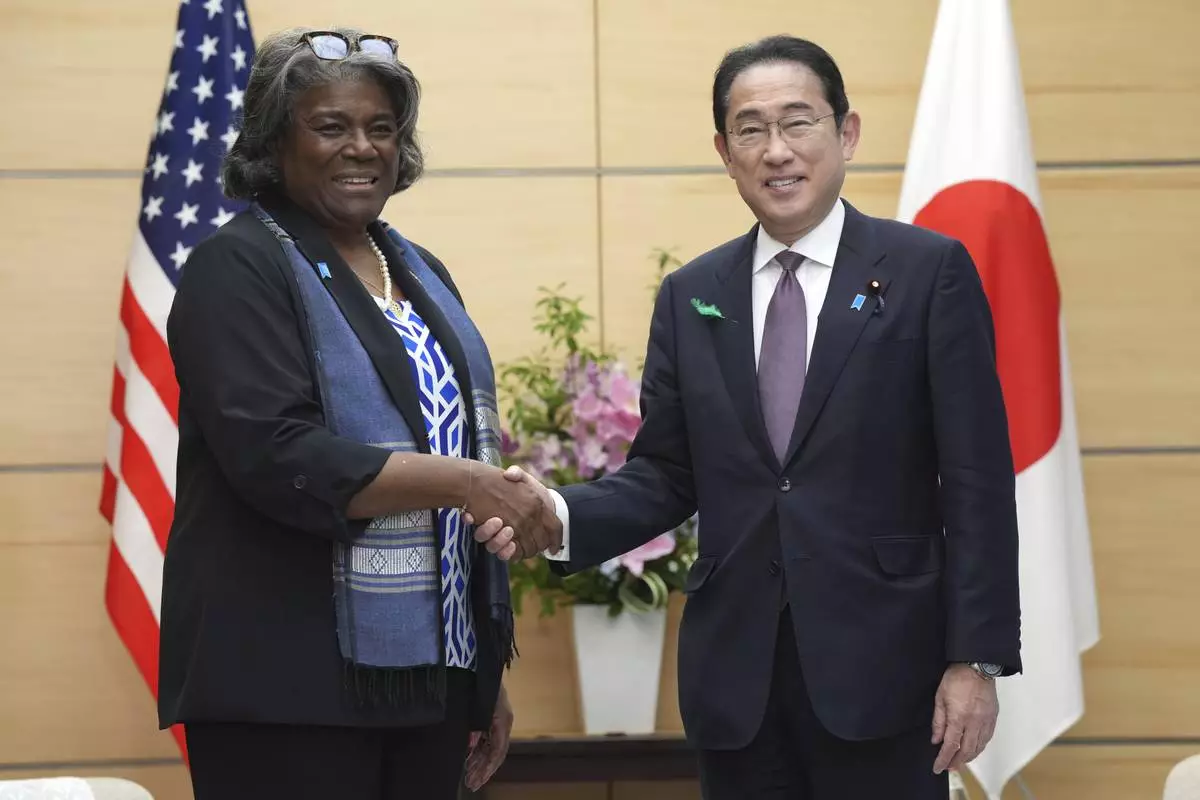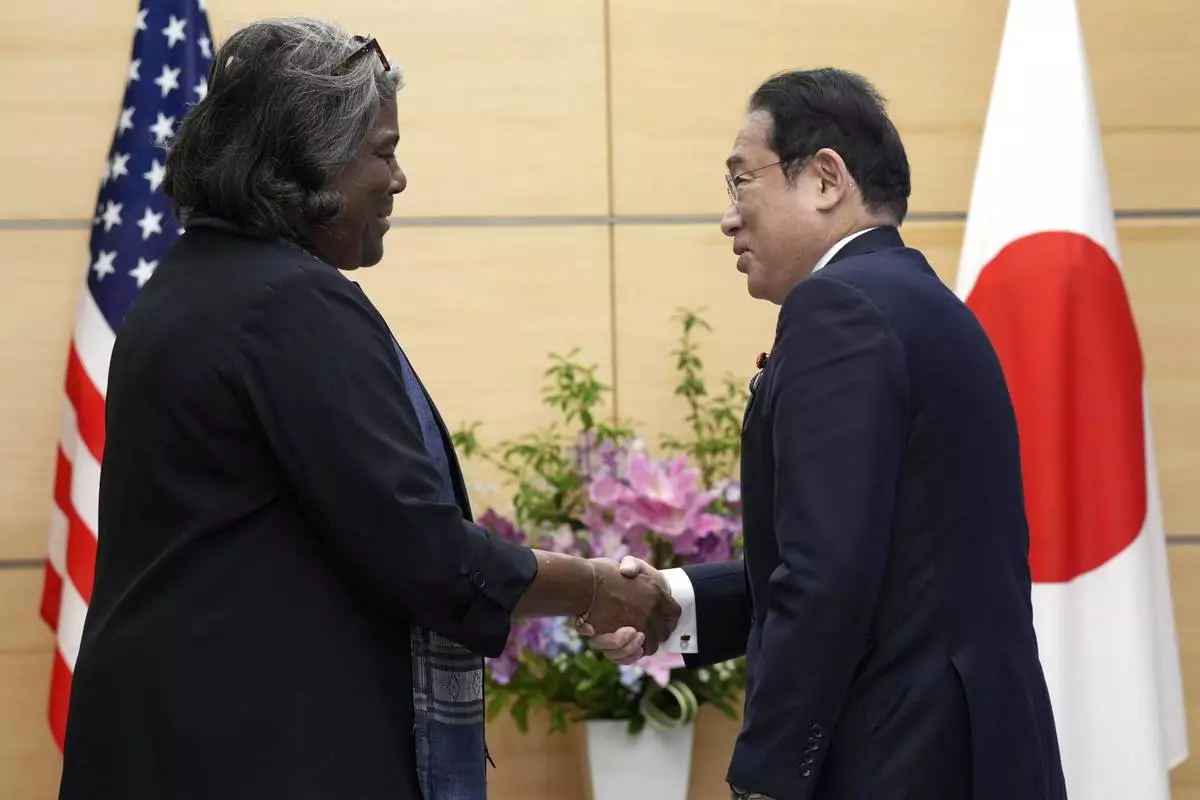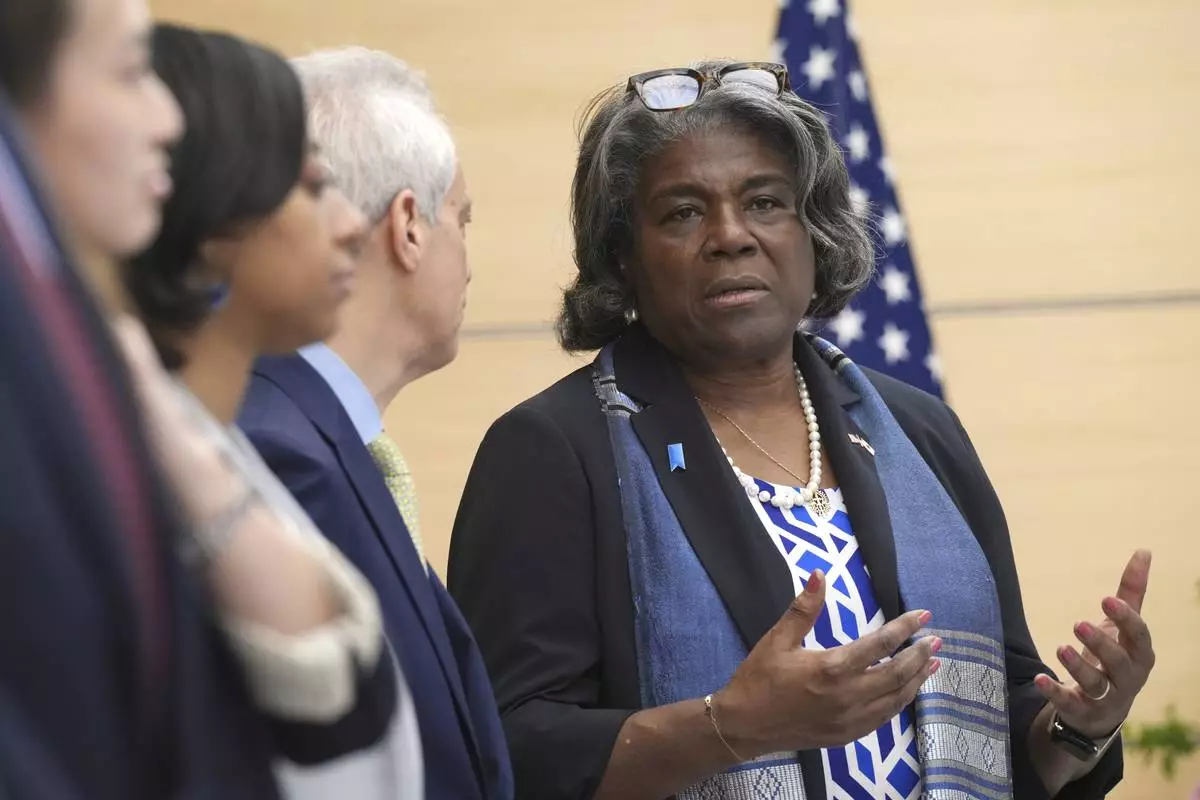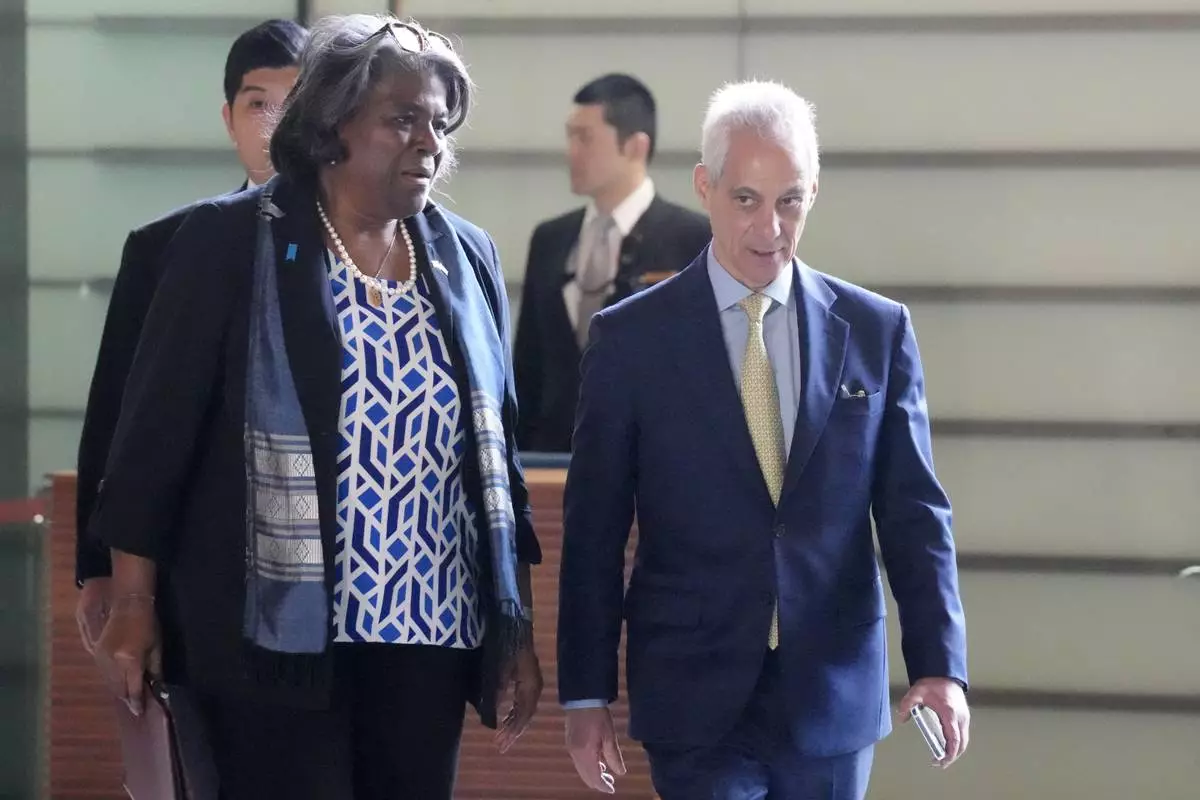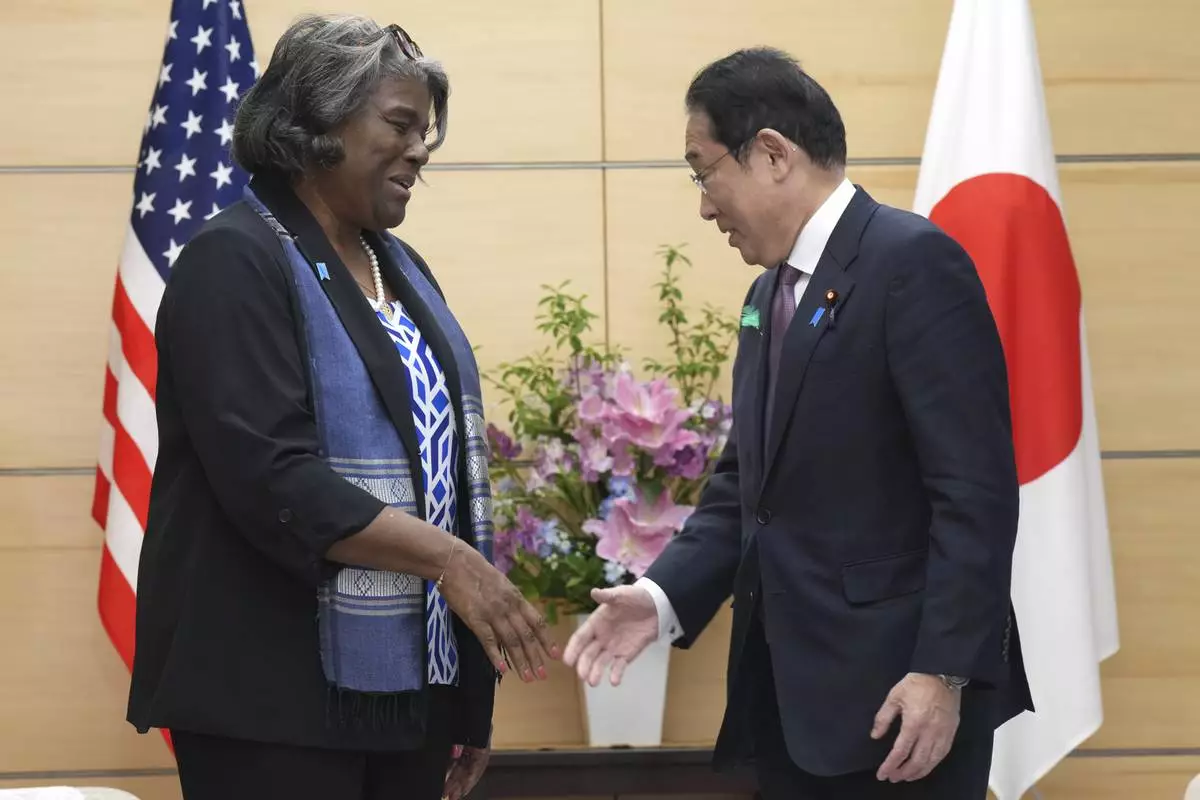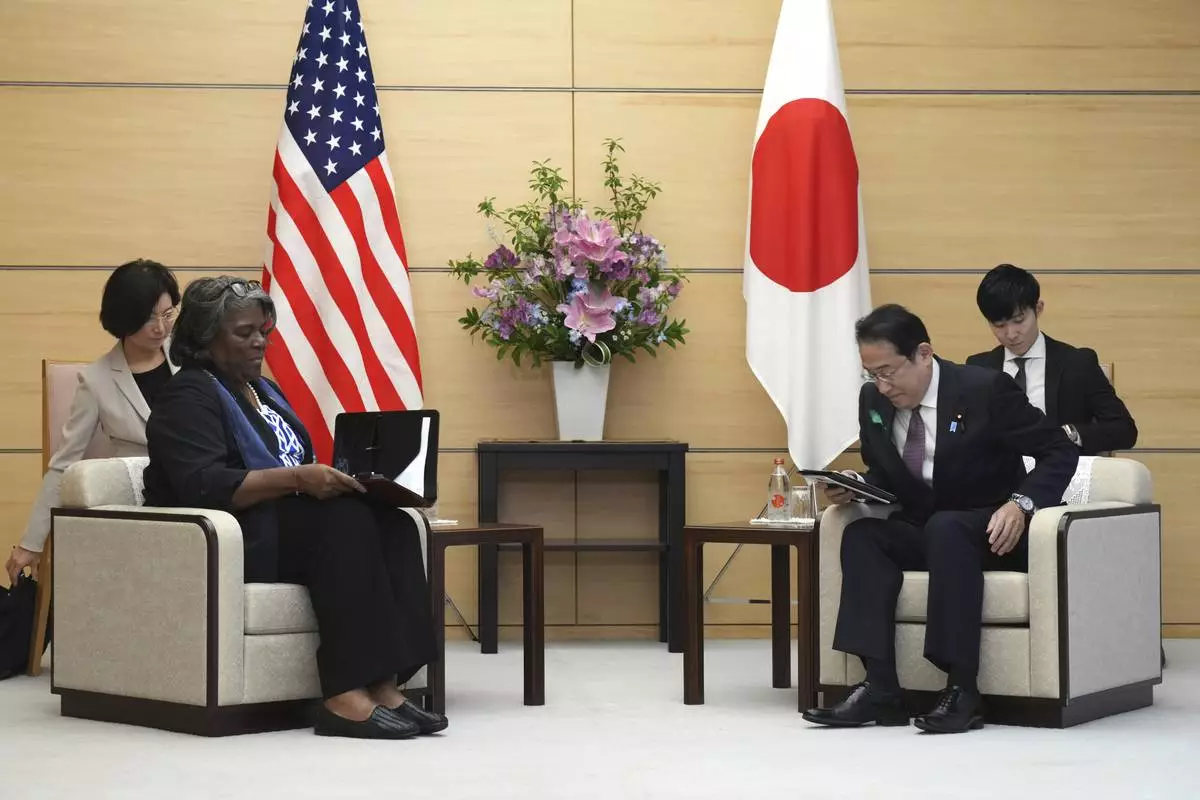President Donald Trump says John McCain failed his fellow veterans, stained public policy and took anti-Trump fake news to the FBI before the 2016 election.
McCain can't respond but his record speaks.
Trump misrepresented it, on matters stretching from McCain's school days to his funeral, as he went on a tear about the late Arizona senator, Republican presidential candidate, Vietnam War naval aviator and tortured prisoner of war.
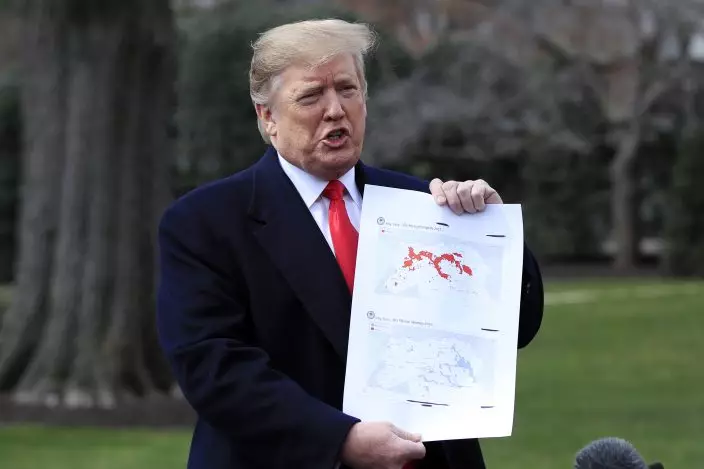
President Donald Trump shows a map of Syria and Iraq showing the presence of the Islamic State (IS) in 2017 and 2019, as he speaks to reporters before leaving the White House in Washington, Wednesday, March 20, 2019, for a trip to visit an Army tank plant in Lima, Ohio, and a fundraising event in Canton, Ohio. (AP PhotoManuel Balce Ceneta)
A look at Trump's bad-blood comments on McCain and his words on other subjects over the past week:
McCAIN
TRUMP: "I gave him the kind of funeral that he wanted. ...I didn't get 'thank you.' That's OK. We sent him on the way. " — remarks Wednesday at the Army tank factory in Lima, Ohio.
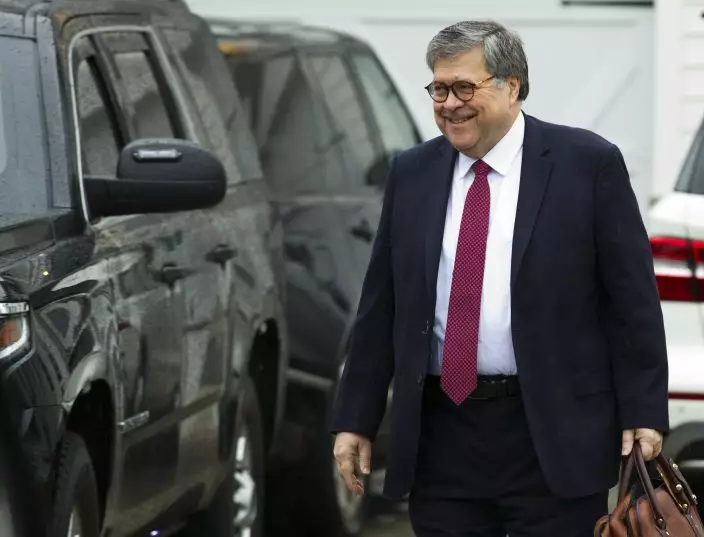
Attorney General William Barr leaves his home in McLean, Va., on Thursday, March 21, 2019. Special Counsel Robert Mueller is expected to present a report to the Justice Department any day now outlining the findings of his nearly two-year investigation into Russian election meddling, possible collusion with Trump campaign officials and possible obstruction of justice by Trump . (AP PhotoJose Luis Magana)
THE FACTS: Trump did not "give" a funeral for McCain. He did sign off on the military transport of McCain's body. But the venues and arrangements were the responsibility of others. And thanks were conveyed.
At the time, McCain family spokesman Rick Davis cited "the Trump administration, the White House," the defense secretary and department, and the Military District of Washington for their combined effort on logistics. "We really thank them for coming together very quickly and pulling together all of the federal resources," he said.
McCain's family made clear that Trump was not welcome during the weeklong, cross-country ceremonies that the senator had planned himself. Instead, McCain invited former Presidents George W. Bush, who defeated McCain during the 2000 GOP nomination fight, and Barack Obama, the Democrat who defeated him in 2008, to deliver eulogies on the value of pursuing goals greater than oneself. Trump went golfing and was uncharacteristically quiet on Twitter during the Washington events.
TRUMP, asked why he is criticizing a dead senator who can't defend himself: "When they ask me the question, I answer the question. But you people bring it up. I don't bring it up." — Fox Business Network interview broadcast Friday on "Mornings with Maria."
THE FACTS: This is false. Trump has been assailing McCain without any prompting by the media. He tweeted a week ago about "last in his class" McCain (who wasn't last in his class), after a tweet about "stains" on the late senator's record.
And after extended opening remarks in the speech at the Army tank factory on Wednesday, Trump abruptly segued by telling his audience: "A lot of people are asking, because they love me, and they ask me about a man named John McCain." He went on to devote nearly 800 words to criticisms of McCain.
TRUMP: "McCain didn't get the job done for our great vets. ... The vets were on my side because I got the job done. I got Choice and I got accountability." — remarks at tank factory.
THE FACTS: What Trump got done was an expansion of the Choice program achieved by McCain and Sen. Bernie Sanders, co-authors of legislation giving veterans the choice of private medical care at public expense if they have to wait too long for Veterans Affairs Department care.
That legislation was signed into law by Obama, not Trump.
McCain didn't rest after the law was enacted. He fought to expand the program and achieved that, too, in his last months.
Congress approved the expansion in May and Trump signed the legislation in June. It's named after three veterans who served in Congress.
One of them is McCain.
It's called the John S. McCain III, Daniel K. Akaka, and Samuel R. Johnson VA Maintaining Internal Systems and Strengthening Integrated Outside Networks Act of 2018.
TRUMP: "Well, you better love me; I kept this place open, that I can tell you." — opening line in speech at tank factory.
THE FACTS: He may have a plausible case to make that he has kept the plant open. It was at risk of closing during the Obama administration, and Trump achieved a large increase in military spending last year.
Trump did not mention the formal name of the act he signed that increases the military budget. It's called the John S. McCain National Authorization Act in honor of the senator's efforts to support military capability as well as higher pay for troops, which the law provides.
Trump signed the law Aug. 13 and did not credit McCain then, either. The senator died Aug. 25.
TRUMP: "John McCain received a fake and phony dossier. Did you hear about the dossier? It was paid for by Crooked Hillary Clinton. Right? And John McCain got it. He got it. And what did he do? He didn't call me. He turned it over to the FBI, hoping to put me in jeopardy." — remarks at tank factory.
TRUMP: "So it was indeed (just proven in court papers) 'last in his class' (Annapolis) John McCain that sent the Fake Dossier to the FBI and Media hoping to have it printed BEFORE the Election. He & the Dems, working together, failed (as usual)." — tweet March 17.
THE FACTS: Trump's chronology is incorrect. McCain did not present then-FBI Director James Comey with a copy of the memos compiled by former British spy Christopher Steele until December 2016, after the election, according to a deposition from a McCain associate, David Kramer. FBI officials had access to Steele's research on Trump before the election, as they referred to it as part of an application for a secret search warrant of Trump associate Carter Page.
Trump often claims falsely that special counsel Robert Mueller's Russia probe was based on the dossier. That probe examined Russian interference in the 2016 U.S. presidential election and possible coordination with the Trump campaign. The FBI's investigation actually began months before it received the dossier of anti-Trump research financed by the Democratic Party and Clinton's campaign. The FBI probe's origins were based on other evidence — not the existence of the dossier.
There is no evidence that McCain provided the dossier to the news media.
And while McCain famously racked up demerits and earned poor grades at the U.S. Naval Academy in Annapolis, Maryland, he ultimately graduated fifth from the bottom of his 1958 class, not last.
ECONOMY
TRUMP: "We've created more than almost 6 million jobs since the election. And if I would have said that to the fake news during the campaign they would have said, 'He exaggerates.' ... Including almost 600,000 manufacturing jobs." — remarks at tank factory.
THE FACTS: He's not exaggerating on job creation. But that record is not all his, and it's not remarkable.
The economy created about 6 million jobs in the roughly two years before the election, then again in the roughly two years after.
By counting since the election, he's taking credit for jobs created in the last months of the Obama administration. The country has added 466,000 manufacturing jobs, not "almost 600,000," since Trump took office.
TRUMP: "Everyone said, 'You couldn't do it, couldn't bring back manufacturing jobs.' ... We're bringing them back beyond anybody's expectations." — remarks at tank factory.
THE FACTS: It's hard to show that manufacturing has been "brought back." There are now 12.8 million jobs in U.S. factories, below the 13.7 million just before the recession started and far below the roughly 17.2 million in 2000, just before China joined the World Trade Organization and gained greater access to the U.S. market.
TRUMP: "And we just came out — another chart — we just came out with numbers — the Economic Report of the President: 3.1 percent GDP. The first time in 14 years that we cracked 3, right? That's pretty good — 3.1. The press tried to make it 2.9. I said, 'It's not 2.9.' What they did is they took odd months." — remarks at tank factory.
THE FACTS: It's a fiction that 2.9 percent growth comes from a calculation based on "odd months."
It comes from a traditional measure of gross domestic product, comparing growth in the size of one year's economy with the previous year's. That measure shows 2.9 percent growth.
But there's another way to measure, which Trump goes by because it looks better. He is citing a comparison in the size of the economy in the fourth quarter of 2018 and the fourth quarter of 2017. That shows 3.1 percent growth.
Some economists consider this measure to be a legitimate way to look at growth, if not the usual way. But when comparing quarters from one year to the next, Trump is wrong to say that growth hasn't cracked 3 percent in 14 years. In 2015, the second quarter was up 3.8 percent from the year before.
TRADE
TRUMP on the World Trade Organization: "We're doing even better with WTO. We're winning cases all of the sudden, because we never won cases, now we're starting to win cases because they know my attitude. If they don't treat us fairly we get out." — Fox Business Network interview broadcast Friday.
THE FACTS: It's not true that the U.S. always lost trade cases adjudicated by the World Trade Organization before Trump.
The U.S. Trade Representative Office announced in September 2016 a "decisive" WTO victory in a case that the U.S. said had cut its solar exports to India by 90 percent because of that country's domestic content rules.
The office said the Obama administration had brought 23 cases alleging unfair trade practices to the organization and won all of them that had been decided by that point.
TRUMP, on Mueller's report on his Russia investigation: "I want to see the report. And you know who will want to see it? The tens of millions of people that love the fact that we have the greatest economy we've ever had." — remarks Wednesday to reporters at the White House, before Mueller sent the report to Attorney General William Barr on Friday.
THE FACTS: The president is vastly exaggerating what has been a mild improvement in growth and hiring. The economy is healthy but not nearly one of the greatest in U.S. history.
The economy expanded at an annual rate of 2.9 percent last year, a solid pace. But it was just the fastest in four years. In the late 1990s, growth topped 4 percent for four straight years, a level it has not yet reached under Trump. And growth even reached 7.2 percent in 1984.
Independent economists widely expect slower growth this year as the effects of the Trump administration's tax cuts fade, trade tensions and slower global growth hold back exports, and higher interest rates make it more expensive to borrow to buy cars and homes.
RUSSIA INVESTIGATION
TRUMP on the formation of the special counsel investigation: "Again I say, a deputy, because of the fact that the attorney general didn't have the courage to do it himself, a deputy that's appointed appoints another man to write a report." — remarks Wednesday to reporters at the White House.
THE FACTS: The attorney general at the time, Jeff Sessions didn't lack courage in the matter; he lacked standing. He recused himself from anything to do with the Trump campaign's interactions with Russia because his work for the campaign placed him in a potential conflict of interest. It then fell to Deputy Attorney General Rod Rosenstein to decide whether to appoint a special counsel, and he did. Mueller sent his report to the attorney general on Friday.
TRUMP on Mueller: "I know that he's conflicted and I know that his best friend is Comey, who's a bad cop." — remarks Wednesday at the White House.
THE FACTS: Though James Comey succeeded Mueller as FBI director, and though they served together in the Bush administration, the men are not known to be social friends. There is certainly no evidence, as Trump has repeatedly suggested, that they are "best friends."
TRUMP, on the Mueller report: "It's sort of interesting that a man out of the blue just writes a report." — remarks Wednesday.
THE FACTS: Mueller didn't wake up one day "out of the blue" and decide he wanted to write a report. It's mandated under the regulation that spells out the grounds for his appointment and duties as special counsel.
VETERANS
TRUMP: "Instead of waiting in line for two days, two weeks, two months, people waiting on line — they're not very sick, by the time they see a doctor, they are terminally ill — we give them Choice. If you have to wait for any extended period of time, you go outside, you go to a local doctor, we pay the bill, you get yourself better, go home to your family — and we got it passed. We got it done." — remarks at tank factory.
THE FACTS: As he does routinely, Trump exaggerated what's been accomplished with his expansion.
Veterans still must wait for weeks before they can get private care outside the VA system.
The program currently allows veterans to see doctors outside VA if they must wait more than 30 days for an appointment or drive more than 40 miles (65 kilometers) to a VA facility. Under new rules to take effect in June, veterans are to have that option for a private doctor if their VA wait is only 20 days (28 for specialty care) or their drive is only 30 minutes.
But the expanded Choice eligibility may do little to provide immediate help. That's because veterans often must wait even longer for an appointment in the private sector. Last year, then-Secretary David Shulkin said VA care is "often 40 percent better in terms of wait times" compared with the private sector. In 2018, 34 percent of all VA appointments were with outside physicians, down from 36 percent in 2017.
The VA also must resolve long-term financing because of congressional budget caps after the White House opposed new money to pay for the program. As a result, lawmakers could be forced later this year to limit the program or slash core VA or other domestic programs.
Also key to the program's success is an overhaul of VA's electronic medical records to allow seamless sharing of medical records with private physicians, a process expected to take up to 10 years. VA Secretary Robert Wilkie has said full implementation of the expanded Choice program is "years" away.
2016 ELECTION
TRUMP: "I got 306 electoral votes against 223. That's a tremendous victory. I got 63 million more — I got 63 million votes." — remarks Wednesday at the White House.
THE FACTS: He did not have as lopsided a victory over Democrat Hillary Clinton as he suggests.
Trump did indeed win nearly 63 million votes in the 2016 election, but it was fewer than the 65 million for Clinton, who won the popular vote after racking up lopsided victories in big states such as New York and California, according to election data compiled by The Associated Press. Clinton, however, lost the presidency due to Trump's winning margin in the Electoral College, which came after he narrowly won less populous Midwestern states, including Michigan and Wisconsin.
As is typical, Trump also misstates the Electoral College vote. The official count was 304 to 227, according to an AP tally of the electoral votes in every state.
Associated Press writers Kevin Freking, Eric Tucker, Jill Colvin and Laurie Kellman contributed to this report.
Find AP Fact Checks at http://apne.ws/2kbx8bd
Follow @APFactCheck on Twitter: https://twitter.com/APFactCheck



